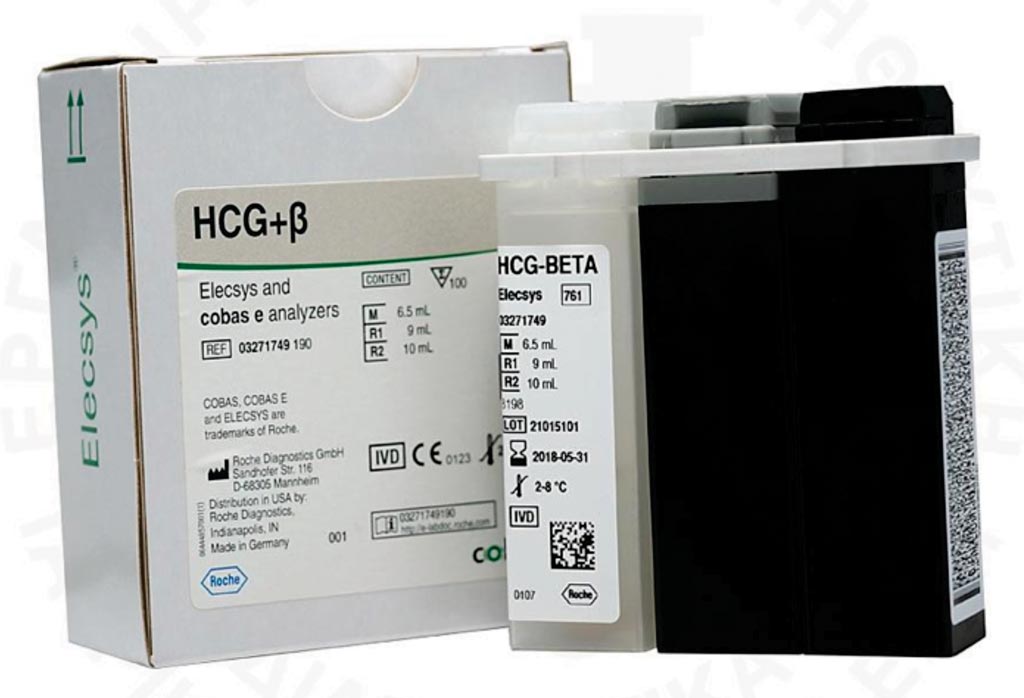Prenatal Reflex DNA Screens for Three Trisomies
By LabMedica International staff writers
Posted on 22 Nov 2017
At present, women are offered screening for these three chromosome disorders at 10-14 weeks of pregnancy. The test combines an ultrasound scan and a blood test, and if it shows that a woman is at an increased risk of having an affected pregnancy.Posted on 22 Nov 2017
Women are offered a diagnostic test, an amniocentesis or chorionic villus sampling (CVS); these are invasive tests that involve inserting a needle through the mother's abdomen into her womb to collect samples of fluid surrounding the fetus or tissue from the placenta.

Image: Pregnancy-associated plasma protein A and free β-human chorionic gonadotropin assays (Photo courtesy of Roche).
Medical scientists at Queen Mary University of London (QMUL, UK) have demonstrated that it is possible to incorporate DNA analysis into antenatal screening for three serious chromosome disorders, including Down's syndrome, in a way that is far more accurate than existing methods, and safer and less stressful for mothers. The new method, called antenatal "reflex DNA screening," which screens for Down's syndrome, Edwards syndrome and Patau syndrome, detected more affected pregnancies than the test it replaced, with far fewer false-positives. Reflex DNA screening combines conventional screening with new DNA testing. The method was implemented in five UK NHS maternity units, screening over 22,000 women between April 2015 and August 2016, and continues to be in use.
The scientists collected blood for the serum and plasma samples was collected in a plain tube and an anticoagulant tube between 11 and 13 completed weeks of pregnancy and three pregnancies were tested in the 10th completed week of pregnancy. The combined test was performed on the serum sample using Roche pregnancy-associated plasma protein A and free β-human chorionic gonadotropin assays. Combined test risks were calculated separately for trisomy 21, trisomy 18, and trisomy 13 using the αlpha software.
The team reported that of the 22,812 women screened, 11% had a reflex DNA test. It detected 101 out of the 106 pregnancies affected with one of the three disorders, with only four false-positives, yielding a 95% detection rate compared with 81% using the existing conventional test alone, and a 0.02% false-positive rate, a 100-fold reduction in false positives from 2.42% for the combined test. Among pregnancies that tested positive and where the women were offered an invasive diagnostic test, 25 out of 26 were affected by one of the syndromes.
Sir Nicholas John Wald FRS, FRCP, a professor and lead author of the study, said, “The reflex DNA approach has beneficial resource implications by reducing the number of women who need counselling on account of a positive screening result, and by avoiding about five out of six diagnostic amniocenteses that would otherwise be indicated. The extra costs of the DNA tests are offset against savings from fewer amniocenteses and associated counselling. The overall balance of costs and savings can be chosen by adjusting the proportion of women who have a reflex DNA test.” The study was published on November 9, 2017, in the journal Genetics in Medicine.
Related Links:
Queen Mary University of London














